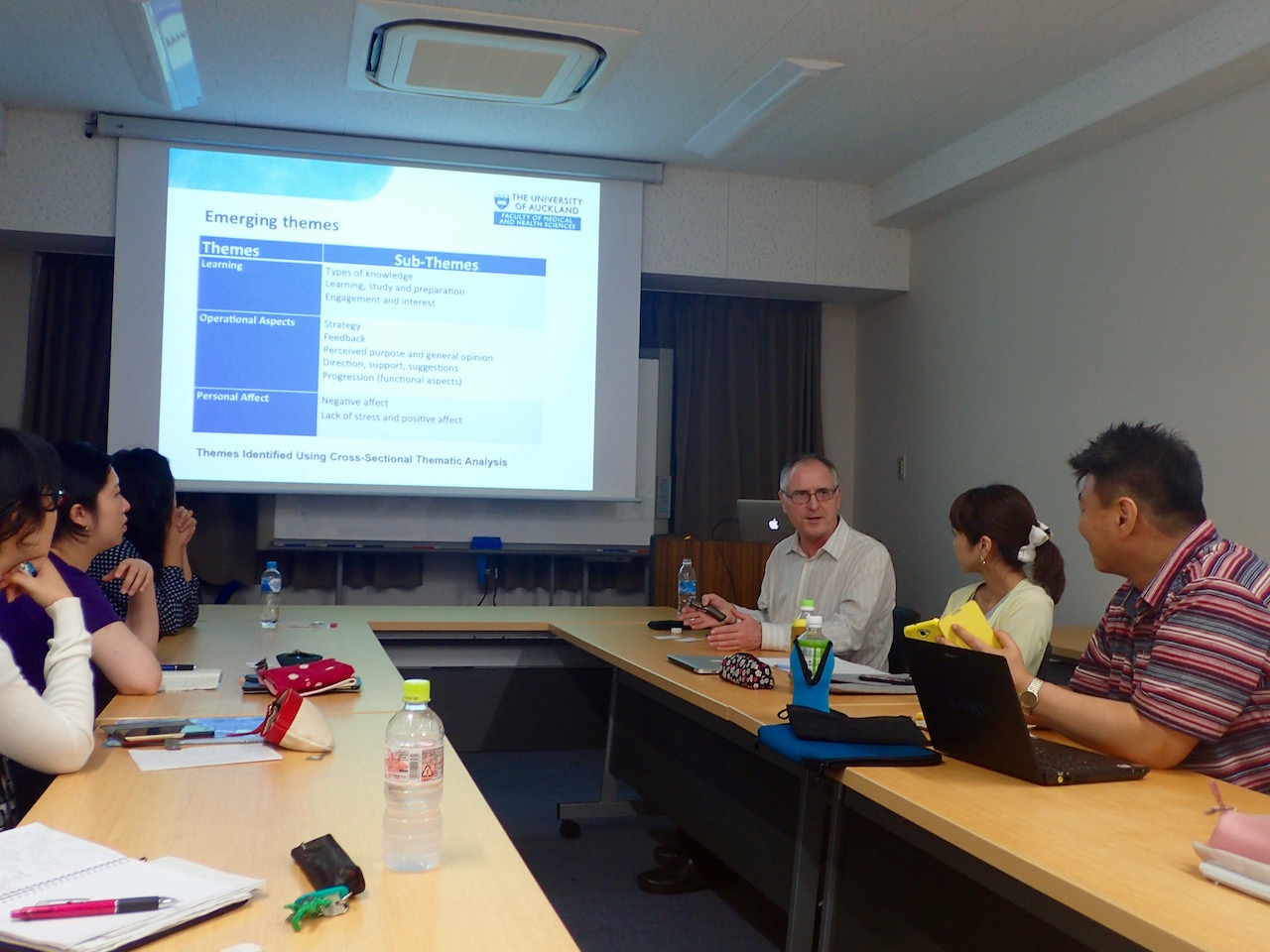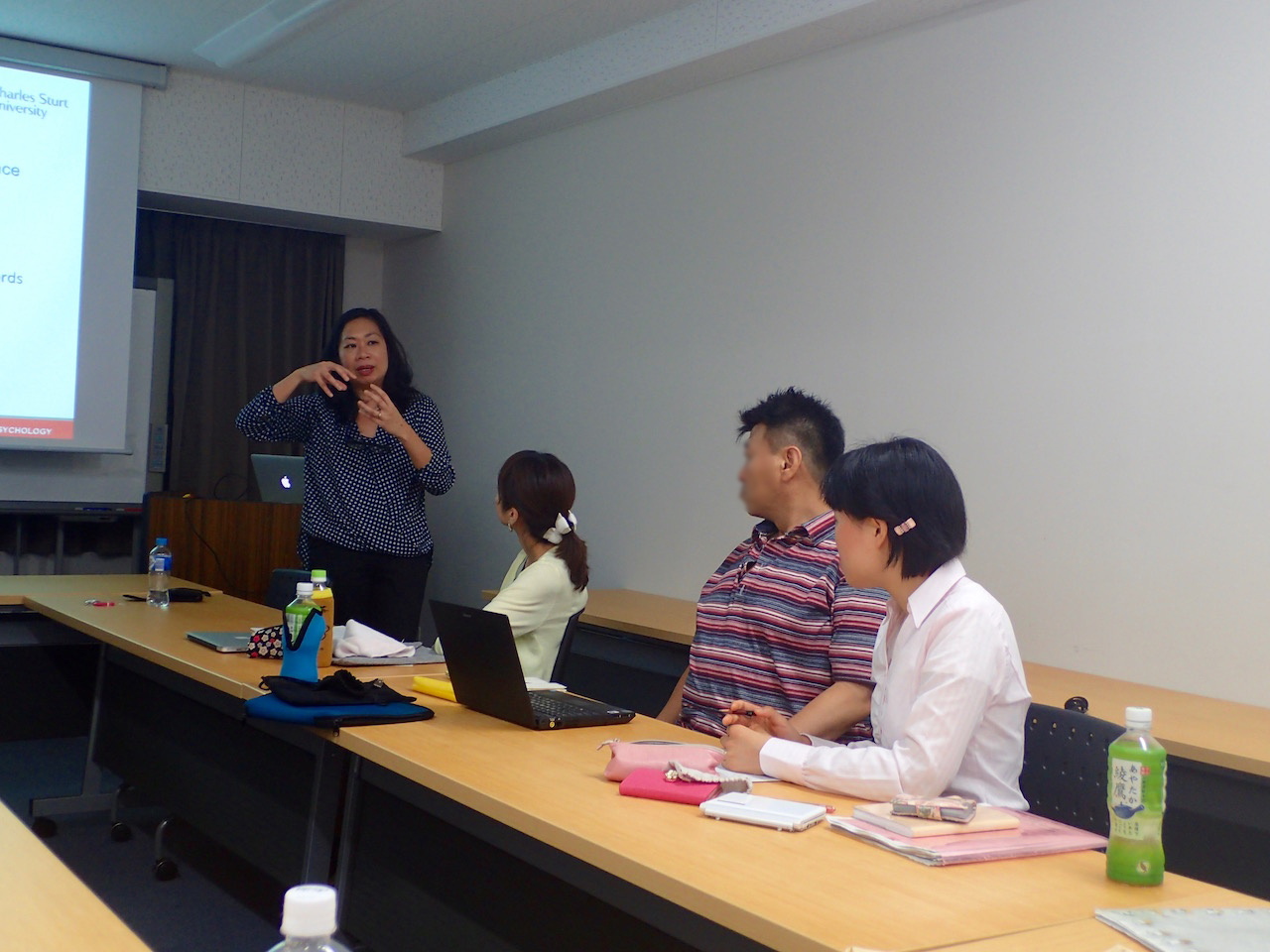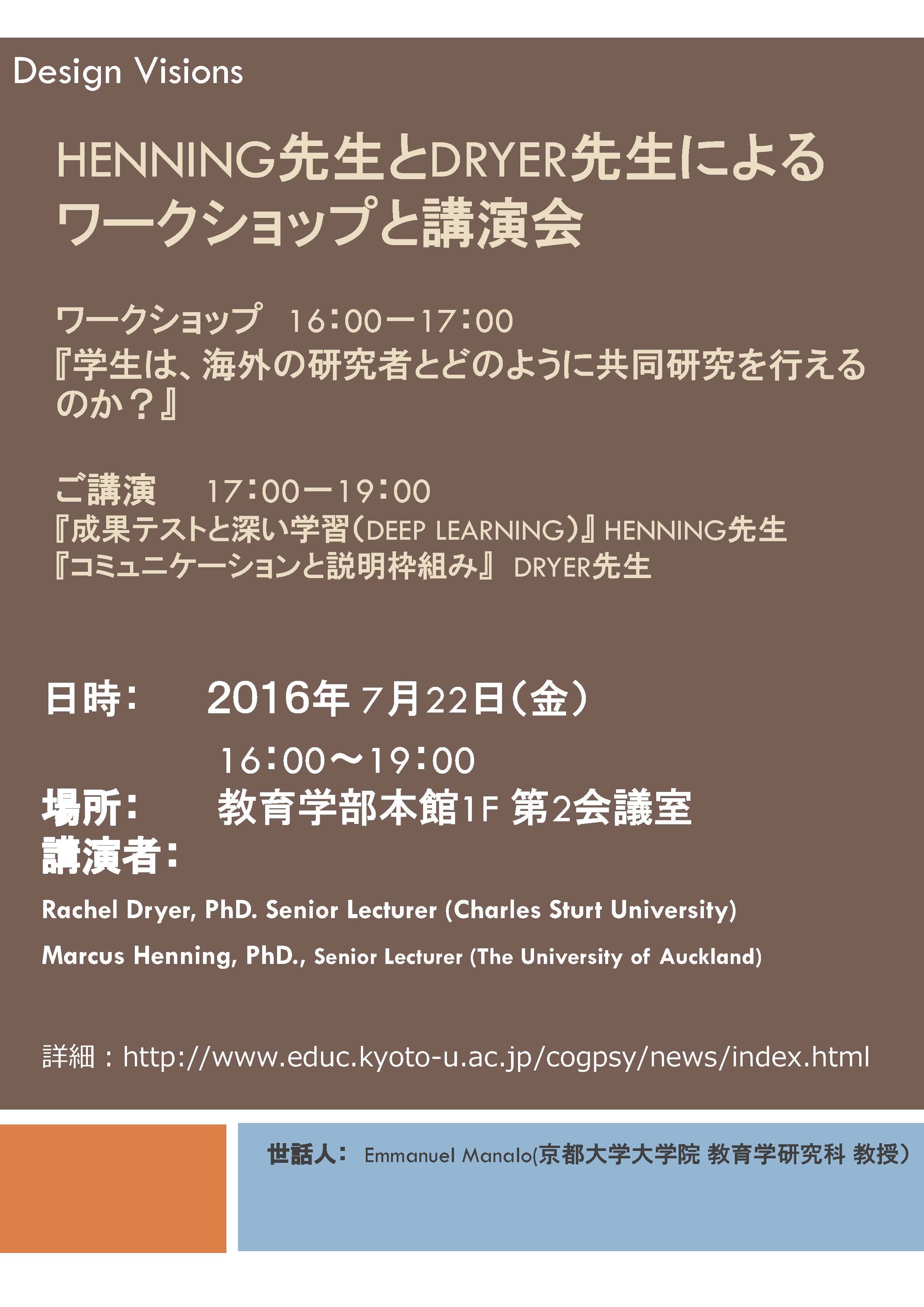"PROGRESS TESTING AND DEEP LEARNING" and
"COMMUNICATION AND EXPLANATORY FRAMEWORKS"
Date and Time: Friday, July 22, 2016 16:00-19:00
Location: The 2nd conference room, 1st Floor Faculty of Education Main Bldg., Kyoto University
http://www.kyoto-u.ac.jp/en/access/yoshida/main.html (No.21 on the map)
https://www.google.com/maps/place/35°01’40.2%22N+135°46’52.0%22E
No registration necessary
Sponsored by: Collaborative Graduate Program in Design (Design School) and
Graduate School of Education, Kyoto University
Contact: manalo.emmanuel.3z[at]kyoto-u.ac.jp(Please change [at] to @.)
Emmanuel Manalo (Professor, Graduate School of Education)
Abstract:
1. WORKSHOP with Dr. Henning and Dr. Dryer 16:00-17:00
How can students be collaborative with other researchers outside Japan?
2. PROGRESS TESTING AND DEEP LEARNING 17:00-18:00
Marcus Henning, PhD
Centre for Medical and Health Science Education, The University of Auckland, NEW ZEALAND
Progress Testing involves the use of a large common questions bank aimed at assessing all students in a programme against the entire degree course graduate outcomes. Therefore, students in all years of study ? Years 1 to 6 ? are administered the same questions. This process of assessment is becoming more popular in medical and health science courses in New Zealand and Australia. However, there is an interesting debate as to whether it cultivates deeper learning than traditional forms of assessment. In our research we have operationalized several variables: year of study, perceived level of stress, acquisition of deep or surface learning, and academic attainment. In this lecture, I will discuss our findings and relate these to relevant theories of assessment and student learning practices. I will discuss both the quantitative and qualitative findings associated with this investigation. I will further discuss the research and educational implications of the findings of the study, particularly in designing courses to promote and monitor achievement of intended graduate outcomes.
3. COMMUNICATION AND EXPLANATORY FRAMEWORKS 18:00-19:00
Rachel Dryer, PhD
School of Psychology, Charles Sturt University, AUSTRALIA
Communication refers to the act of conveying or imparting information to another individual through speaking, writing and/or using some other medium. The manner in which information is communicated greatly influences individuals’ beliefs about the world around them. For example, the type of information about psychological conditions conveyed to the general public have been shown to influence lay people’s mental health literacy, their explanatory frameworks (i.e., beliefs about cause and treatment) as well as their help-seeking behaviours and treatment compliance. This lecture will discuss the results of a cross-cultural study on Bulimia Nervosa conducted with Japanese and Australian participants, and the implications for cross-cultural design and delivery of public education programs and intervention for this condition in Japan. Additionally, this lecture will discuss the implications of the findings to the wider issue of how higher education students learn, consume and process information, as well as issues that need to be kept in mind when designing methods to effectively communicate information to target audiences.
概要:
1. WORKSHOP with Dr. Henning and Dr. Dryer 16:00-17:00
”How can students be collaborative with other researchers outside Japan?”
ヘニング先生とドライヤー先生とのワークショップ
『学生は、海外の研究者とどのように共同研究を行えるのか?』
2. “PROGRESS TESTING AND DEEP LEARNING” 17:00-18:00
Marcus Henning, PhD,
Centre for Medical and Health Science Education, The University of Auckland, NEW ZEALAND
『成果テストと深い学習(deep learning)』
マーカス・ヘニング博士
ニュージーランド オークランド大学 医療健康科学教育センター
3. “COMMUNICATION AND EXPLANATORY FRAMEWORKS” 18:00-19:00
Rachel Dryer, PhD
School of Psychology, Charles Sturt University, AUSTRALIA
『コミュニケーションと説明枠組み』
レイチェル・ドライヤー博士
オーストラリア チャールズ・スタート大学 心理学研究科
Report: At Graduate School of Education, on July 22, 2016, we held workshop and lecture by Dr. Henning and Dr. Dryer in the 2nd meeting room of main building of School of Education.
At Graduate School of Education, on July 22, 2016, we held workshop and lecture by Dr. Henning and Dr. Dryer in the 2nd meeting room of main building of School of Education.
The workshop and lectures went very successfully. From 16:00 to 17:00, during the workshop, Dr Henning and Dr Dryer explained to the student participants why it is essential to develop research collaborations in the academic environments of the 21st Century. They then provided some advice about how to develop such collaborations and how to ensure that such collaborations succeed to benefit all collaborators.

Then, from 17:00 to 18:00, Dr Henning provided his lecture about the use of progress testing at the University of Auckland Medical School and the research he is involved in to assess the impact of such testing on students’ learning behaviors and performance. His lecture was followed by a lively discussion on the possible advantages and disadvantages of using progress testing. This was followed by Dr Dryer’s lecture from 18:00 to 19:00. In her lecture, Dr Dryer discussed the importance of how information is communicated to people. She then described her research in eating disorders, and explained her findings that Australian and Japanese women have different beliefs about the causes of and treatments for eating disorders. She believes that such differences have been caused by differences between the two countries in the way information about eating disorders is communicated to the general public. Dr Dryer’s lecture was also followed by questions from the audience and some lively discussion.
京都大学 デザイン学大学院連携プログラムKyoto University PAGE TOP
 フライヤー(PDF)
フライヤー(PDF)